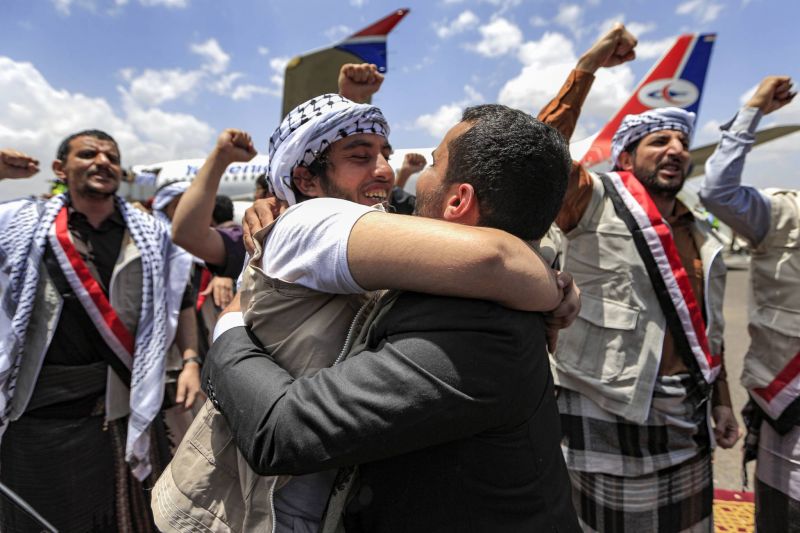
A man embraces one of the returned Houthi prisoners exchanged in a deal Yemen's internationally recognized-government upon arrival at Sanaa International Airport on April 14, 2023. (Credit: Mohammed Huwaid/AFP)
Yemeni rebels and government forces on Sunday finished an exchange of nearly 900 prisoners after a Saudi delegation returned from Houthi rebel-held Sanaa last Thursday with promises for an “initial agreement on a truce” to be developed during a second round of talks, Houthi rebel and government sources told AFP. Crowds formed at the Sanaa and Aden airports to welcome the prisoners, some of whom had been in captivity for at least six years. The Saudi visit sought to “stabilize” a truce between rebels and the government after a UN-brokered ceasefire expired in October. The Iran-backed Houthis seized Sanaa in 2014, prompting the Saudi-led intervention the following year. Hundreds of thousands have died in the conflict, which triggered a major humanitarian crisis.
More than 270 civilians were killed and nearly a thousand others were wounded by a conflict between the Sudanese regular army and paramilitary Rapid Support Forces (RSF) that erupted on Saturday after a protracted power struggle. Thousands of civilians fled from Khartoum after fighting resumed despite an agreement to a 24-hour ceasefire on Tuesday, the fifth day of fighting. The World Health Organization warned that the fighting had damaged hospitals, which became overcrowded and undersupplied amid a third day of intense fighting. Army chief Abdel Fattah al-Burhan and his deputy, RSF head Mohamed Hamdan Daglo, who co-orchestrated a military coup in 2021 traded blame for the start of fighting — which reportedly erupted after disagreements over the integration of the paramilitary group in the regular army. The coup triggered international aid cuts and sparked near-weekly protests — during which authority crackdowns killed more than 120 civilians.
Syrian President Bashar al-Assad on Tuesday met with the Saudi Foreign Minister in Damascus, the latest in a series of steps aiming to restore ties within the region. Also on Tuesday, Qatar and the United Arab Emirates announced the restoration of ties six years after they were severed over accusations that Qatar supported terrorism. Officials from the Gulf Cooperation Council countries, Egypt, Iraq and Jordan met in Jeddah last Friday to discuss the restoration of ties with Syria, two days after Iranian and Syrian envoys visited Saudi Arabia. A Riyadh-based diplomat anonymously told AFP the meeting aims to avoid any discord among the six GCC nations, notably ensuring that “Qatar does not object to Syria's return to the Arab League,” which is slated to hold its next summit in Saudi Arabia next month — as rumors circulate of an invitation being proffered to Syria. The Arab League suspended Syria’s membership in 2011 amid violent crackdowns on protests — which escalated to a civil war that has claimed half a million lives and forced about half of Syria's pre-war population from their homes. Saudi Arabia’s steps towards normalization with Syria follow a China-mediated rapprochement between the Arabian kingdom and Iran — which as of Saturday continued with new steps towards the reopening of embassies and culminated with an Iranian invitation extended to the Saudi king to visit Tehran.
On Tuesday, Israeli soldiers wounded seven people during a raid in the West Bank and a suspected Palestinian gunman injured two motorists during a Tuesday attack in annexed east Jerusalem. Israeli forces on Wednesday announced the arrest of a Palestinian teenager who allegedly carried out the attack on Tuesday. Thousands of Israeli police officers were deployed in Jerusalem last Friday as hundreds of Muslim worshippers attended noon prayers at the Al-Aqsa mosque. Prayers proceeded peacefully for a second week after an attack by Israeli police on Al-Aqsa sparked violent confrontations that escalated into rocket exchanges between Israel and Gaza, southern Lebanon and Syria. More than 90 Palestinians and at least 19 Israelis and foreigners have been killed since January, in what has been one of the deadliest years for Palestinians amid heightened violence by settlers and Israeli forces.